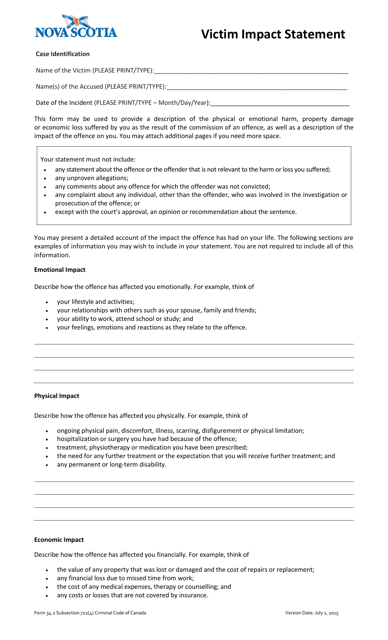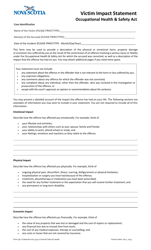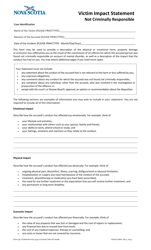Form 34.2 Victim Impact Statement - Nova Scotia, Canada
Form 34.2 Victim Impact Statement in Nova Scotia, Canada is used to allow victims of crime to describe to the court how the crime has affected them physically, emotionally, and financially. It helps the court understand the impact of the crime on the victim and can be considered during sentencing.
In Nova Scotia, Canada, the victim files the Form 34.2 Victim Impact Statement.
FAQ
Q: What is a Victim Impact Statement?
A: A Victim Impact Statement is a document that allows victims of crime to express the impact the crime has had on them.
Q: Who can submit a Victim Impact Statement in Nova Scotia, Canada?
A: Victims of crime or their representative can submit a Victim Impact Statement.
Q: How can I submit a Victim Impact Statement in Nova Scotia, Canada?
A: You can submit a Victim Impact Statement by completing a Form 34.2 and sending it to the Crown prosecutor handling your case.
Q: What information should be included in a Victim Impact Statement?
A: A Victim Impact Statement should include information about the physical, emotional, and financial impact of the crime, as well as any recommendations for restitution or sentences.
Q: Is a Victim Impact Statement confidential?
A: Yes, in most cases, the information provided in a Victim Impact Statement is kept confidential.
Q: Can a Victim Impact Statement affect the outcome of a criminal case?
A: Yes, a Victim Impact Statement can be considered by the court when determining a sentence for the offender.
Q: Are Victim Impact Statements mandatory in Nova Scotia, Canada?
A: No, submitting a Victim Impact Statement is optional for victims of crime in Nova Scotia, Canada.
Q: Can I update my Victim Impact Statement after submitting it?
A: In some cases, you may be able to provide additional information or updates to your Victim Impact Statement prior to sentencing.






